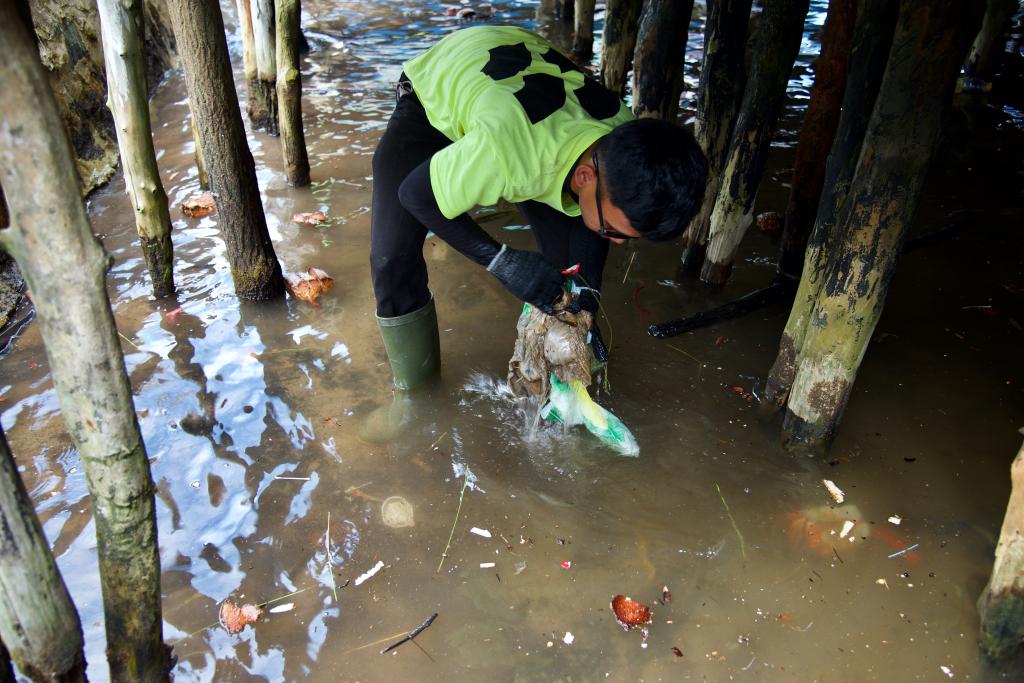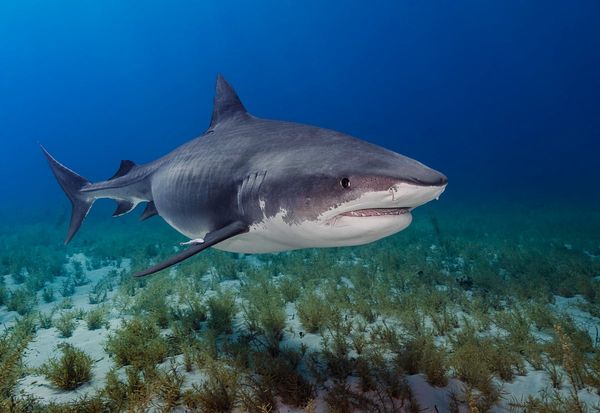
I’m standing on the beach of a remote fishing village off the shore of the Indonesian island of Bintan. Around me are small huts scattered about the beachside, roosters and chickens run around freely. As do the kids of the village, wearing football jerseys and clothes too big — but not as big as their grins as they scamper about in the jovial levity of childhood; a language spoken by all kids across the globe.
I see another group of kids, splashing about in the ocean. The water is clear — clear enough to see that something is very wrong. There is no sand, at least, not much that can be seen. The ocean floor is a sad bed of layers of plastic debris. The kids don’t seem to care, which is depressing. This is their normal.

Welcome to Air Gelubi — an island village that has one of the highest levels of environmental plastic waste leakage globally, just one of the forgotten frontlines of the global fight against plastic pollution.
Every year, the ocean is littered with between 20 billion and 34 billion plastic PET bottles are produced and sold by the soft drink or Non-Alcoholic Ready to Drink (NARTD) industry. It’s a problem the soda industry doesn’t want to acknowledge, despite being the most culpable. And villages like Air Gelubi are just one of thousands across the planet that pay for the carelessness of modern capitalism.

This problem has been festering for decades. 171 trillion pieces of plastic currently float in our oceans, a devastating increase from the 16 trillion pieces in 2005. This is one of the most pressing environmental issues humanity has ever faced, and without action now, things will only get worse. A lot worse.
Just last month, UNEP (UN Environment Programme) chief Inger Andersen said of plastic waste: “We cannot recycle our way out of this mess”, adding that “only elimination, reduction, a full life-cycle approach, transparency and a just transition can bring success.”
And that’s what brings me here — a first-world observer feeling guilty and helpless at the same time — although I’m holding a large bag, wearing gloves, picking up the odd bit of plastic all at various stages of degradation. I’m not doing much at all compared to the dozens around me dressed in bright yellow — an army of full-time ocean clean-up crew assembled by Seven Clean Seas, an ocean clean-up organisation based in Bali.

I’m here along with a team from Lo Bros, who have teamed up with Seven Clean Seas to help clean up the ocean, one can at a time. For every can of Not Soda purchased, Lo Bros has pledged to remove two plastic bottles from the ocean — with the help of Seven Clean Seas — while also committing to removing plastic from the entire brand, in favour of the more recycle-friendly material of aluminium.

Didi Lo, also on Air Gelubi joining the clean-up initiative, believes Australia has a responsibility to do what it can to help its neighbours. “Australia has incredible marine life and biodiversity, and we’re a neighbour to Indonesia who, like us, has incredible biodiversity — but is under massive threat,” he says. “So through our partnership with Seven Clean Seas, we’re actually able to do something about it.”
“We created Not Soda really with this idea of tackling the issues of the soft drink industry head-on. Today we’re at this beautiful little fishing village, just off the island of Batan, and it’s amazing — there’s these wonderful houses on stilts — what’s not so amazing is the plastic rubbish that is literally everywhere. It’s probably a metre deep on the edge of the ocean, and wherever you look it’s just littered. It’s so overwhelming, the scale of the problem here.”

Tom Peacock-Nazil, Founder and CEO of Seven Clean Seas, is a passionate advocate for cleaning up the ocean, and building sustainable infrastructure to prevent further plastic from entering our oceans.
“Seven Clean Seas wants to get out there and build projects that directly remove plastics from the ocean, and stop it getting there in the first place,” he says. “A big part of that comes down to building infrastructure, hiring people formally, and all of this comes at quite a big cost so we need support from a wide variety of different partnerships — like our partnership with Not Soda — to allow us to make the investments we need to scale up our impact, and ultimately stop plastic pollution form being such a pervasive problem in these locations”
At the time of writing, Seven Clean Seas have removed 1,552,736kg of plastic from the ocean, with an aim to hit a target of 10 million kg by the end of 2025.
“I think it’s fair to say that all environmental challenges, whether it’s climate change or the crisis of plastic pollution, can feel extremely overwhelming, but I just want people to realise that you don’t have to change the world on your own. You carry so much power with your decisions around what you buy and where you spend your money.
“You can literally coerce organisations into making better packaging decisions, better environmental decisions, by simply showing that’s where you want to spend your money. Choosing to buy a can over a soda in a PET bottle is starting that journey. We all have the ability to create change on a daily basis with the choices we make, and I do think that the buck can stop with consumers.”

Looking around the island, plastic as far as the eye can see, and knowing this is just one of countless communities around the planet dealing with the scourge of plastic pollution… it’s easy to become cynical. This fight seems impossible; the odds insurmountable.
But, at the same time, on this very island lives hope. Plastic is everywhere, but so too is the raw human spirit — the spirit of cooperation, of joy, of working for a better tomorrow because that tomorrow is achievable. It sounds corny, but it’s true — we all have the power to make a positive change, even if it’s just switching from bottles to cans — that switch can change the world.
All images by Rob Brown / Lo Bros Not Soda
The post Remote Island Villages Are Copping The Brunt Of Our Plastic Use, This Team Is Trying To Fix It appeared first on PEDESTRIAN.TV .







